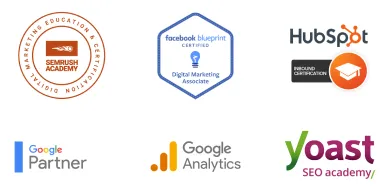TO LEARN IS TO GROW
Learning Center
We do our research and publish our results. Should probably call this the Growing Center.


WordPress Vs. Squarespace: Which Is the Best CMS for a Growing Business?
We compare WordPress and Squarespace so you can decide which content management system is ideal for your growing business.
WordPress Vs. Squarespace: Which CMS Is Ideal for a Growing Business?
WordPress is the world’s most popular content management system, powering up to 62% of all CMS-built websites and accounting for 40% of the entire Web. But in recent years, there has been a rise of beginner-friendly web builders like Shopify, Squarespace, and Wix that have a lower learning curve than WP.
Squarespace is one of the contenders for easy-to-use CMS. As a complete, all-in-one website builder, you don’t have to worry about technical details like setting up a web host and purchasing a domain. Simply put, everything is almost spoonfed thanks to its drag-and-drop editor and a wide selection of themes and plugins.
Another feature that makes Squarespace stand out from the competition is its excellent customer support that includes 24/7 email support and a live chat. In contrast, WP, being an open-source platform, does not come with this feature, although some of its paid themes and plugins offer it.
While Squarespace has notable advantages, it is not suitable for some businesses, especially those expecting growth or needing special features and flexibility.
Ease of Use: WordPress Vs. Squarespace
While WP makes it easy to build a website, Squarespace has taken it to the next level: It doesn’t require any coding experience; the templates can be simply dragged and dropped; and your site will look great on mobile devices without any additional tweaks.
By contrast, WordPress’s user interface feels cluttered and chaotic. However, you can install plugins to make it more of a drag-and-drop website builder that is almost similar to Squarespace.
Functionality and Control
There is a reason why WordPress has the lion’s share of the market: Its massive library of third-party themes and plugins provides businesses full control and flexibility.
Squarespace, meanwhile, only offers a small set of plugins and integrations. While for small businesses and certain professions that rely on visual design–e.g., photography, painting, and arts and craft–the selection is generally enough. But if your company is expecting growth or it requires special features, WordPress remains the best choice.
Pricing: Squarespace Vs. WP
There are many variables affecting the price of WordPress and Squarespace that make it hard, if not impossible, to make an objective comparison.
Squarespace has more straightforward pricing than WordPress with its four all-inclusive plans that cost between $16 and $54 per month.
Personal - $16 per month
Business - $26 per month
Commerce Basic version - $35 per month
Commerce Advanced version - $54 per month
These Squarespace plans, which come with a two-week free trial, include hosting, domain registration, and templates.
On the other hand, the pricing in WordPress is more variable. Another thing you have to consider is that despite being a free, open-source platform, you still need to pay for features to allow your website to work properly.
WP has countless free themes, but the best ones are for sale, costing between $40 and $120. The good news is you get their rights for life.
There are also free WP plugins, but again the best ones are generally for sale, some of which are billed on a recurring basis.
If your website is powered by WordPress, the price boils down to these factors:
Hosting, which is the server space where you install your WP and store your site
Plugins, which add more functionality to your website
E-commerce integration
Themes
Developer
Note: If you’re still testing the water, you may skip hiring your own WP developer. But if you’re expecting business growth, this becomes a necessity rather than a recommendation–unless you’re willing to do all the time-consuming development and maintenance all by yourself.

Best CMS for eCommerce: WP Remains the King
If you want a fully functioning eCommerce, WordPress is the best option for you. Below is the list of reasons why WP is an excellent online platform to sell.
WP has a wide range of eCommerce third-party plugins, including the two most popular and powerful functions: WooCommerce, which is ideal for physical products, and Easy Digital Downloads, which is designed to help companies sell digital products.
In contrast, Squarespace’s eCommerce integrations are quite limited.
WordPress offers a wide selection of payment gateways that serve most countries. The most popular are PayPal Pro, Stripe, Authorize.net CIM, and Braintree.
On the other hand, Squarespace only offers three payment gateways and comes with a limited selection of eCommerce-centric plugins, which results in less functionality.
Another caveat with using Squarespace as an eCommerce platform is the 2-3% transaction fee on top of the credit card processing fee. However, you can avoid this if you upgrade to their more expensive eCommerce plans starting at $30 per month.
Ongoing Maintenance: WP Vs. Squarespace
With Squarespace, you don’t need to worry about maintenance and updates. On the other hand, WP requires a more hands-on approach to maintain your website.
However, the zero-maintenance feature of Squarespace comes with one major caveat, or to be more exact, a huge turnoff: It doesn’t offer backup to your website.
Meanwhile, WordPress requires more maintenance because you are responsible for updating your plugins, themes, security, and backups. This may seem daunting, but take note that there are plugins that can automate these things for you.
Aside from using plugins, these two options also make WordPress maintenance a breeze:
Choose a managed WP host, which is a hosting that optimizes your website, conducts regular maintenance, improves performance, and handles security and backups. These plans also include 24/7 support, email, daily backups, unmetered traffic, staging environments, SSL, CDN, free auto migrations, server-side caching, white labeling, and collaborator options.
Hire a WordPress developer. Visit LOJO Marketing to learn more about website maintenance plans specifically designed for small and growth companies.
Search Engine Optimization: WordPress Wins Hands Down
With the sudden digital shift in the wake of COVID-19, the success of your business depends heavily on search engine optimization (SEO), which is a set of strategies to improve the quality and quantity of website traffic from search engine tools like Google and Bing.
While Squarespace offers an all-in-one SEO package that includes meta title and description customization, SSL, and AMP support, it does not match WP’s SEO features, especially its Yoast SEO Plugin.
In addition, WordPress offers more control over technical SEO setup, which means you can choose a hosting provider that ensures your website is responsive and fast-loading, and above all, in line with Google’s algorithm.
With Squarespace, meanwhile, you can’t choose your hosting provider, and you have limited control over your technical SEO.
Another disadvantage of using Squarespace SEO-wise is that it requires complex coding to add rich snippets, which are bits of data to enhance your search results. By contrast, WP has plugins that can automate this task for you.
Simply put, if you want SEO-centric websites, nothing beats WordPress.
Why Squarespace Is Not Ideal for Growing Businesses
While Squarespace makes it easy to create visually stunning websites, it is not for everyone–especially for growing companies and businesses that need large and complex sites. First and foremost, it cannot support a deep website structure, which means you can only create two-level navigation.
For some businesses, a flat website structure is a good approach because it promotes fast and easy navigation. But for complex organizations and businesses that offer a wide range of products and services, this limitation can spell disaster.
Simply put, WordPress is the safest bet for growth companies.
Only Reasons Squarespace Might Be a Better Option
There are instances when Squarespace might be a better CMS than WordPress:
You’re a freelancer, consultant, or creative talent who needs a visually appealing website.
You need a website (or eCommerce) that is suited for less tech-savvy users.
You give much importance to a user-friendly interface. Squarespace’s drag-and-drop editor makes it easy to layout your content.
You only need a conventional, simple website.
Conclusion: WordPress Is a Better CMS for Growth Businesses
While both WordPress and Squarespace have strengths and weaknesses, WP is a better CMS if you are a growth company that requires more features and flexibility or you need eCommerce and other complex features.
The versatility and functionality of WordPress have made it the go-to CMS of different organizations, ranging from small and local businesses, big corporations, and news journals to online shops and government agencies. (FYI: It even powers the White House website.)
To learn more about website development and design, digital marketing, and SEO, contact LOJO Marketing at (916) 303-4080.
Built for Growth. Backed by 25 Years of Trust.
For over two decades, LOJO has been a trusted partner to hundreds of businesses just like yours. Whether working directly with owners, managers, teams, or boards of directors, our goal remains the same: to be a reliable and results-driven asset to your business.
Over the years, we’ve carefully built a team of experts—each selected for their unique skills, strengths, and personalities. Our clients choose LOJO because they know we genuinely care about their success.
And after 25 years of helping businesses grow, we’re more committed than ever.


Built for Growth. Backed by 25 Years of Trust.
For over two decades, LOJO has been a trusted partner to hundreds of businesses just like yours. Whether working directly with owners, managers, teams, or boards of directors, our goal remains the same: to be a reliable and results-driven asset to your business.
Over the years, we’ve carefully built a team of experts—each selected for their unique skills, strengths, and personalities. Our clients choose LOJO because they know we genuinely care about their success.
And after 25 years of helping businesses grow, we’re more committed than ever.




Matthew Rogers, President
iProspect Check
After spending several months reviewing multiple proposals from several different companies we engaged LOJO to develop a new website that represents our company effectively. We worked initially with Stephen Platte who helped create the scope of the project. Stephen was knowledgeable and always followed up with me on time and as promised.
He "closed the deal" for LOJO with his professionalism, service orientation and easy going approach. Once we signed the contract we were introduced to Jay Kelly who would be the creative lead for LOJO. This was the most challenging part of the project for my company, as there was no shortage of ideas from our side. Jay managed the project flawlessly, and once we had all agreed to the design, Jay introduced us to Eric.
Eric Lay is one of the founders of LOJO. Eric took the design we had developed and brought it to life. We delivered content as quickly as he requested it. Eric kept the project on task and we responded by exceeding every deadline for content. In turn, once provided, literally not a day went by that Eric didn't add the content and take the next step. In just a few weeks we launched our new website. Eric is a pleasure to work with.
His positive attitude and consultative approach really enhanced the experience and made a big difference for us in the outcome of our project. We would welcome you to visit our website to take a look at the quality work of LOJO. We are very pleased with LOJO and look forward to working with them in the future as we pursue an aggressive SEO strategy."
After spending several months reviewing multiple proposals from several different companies we engaged LOJO to develop a new website that represents our company effectively. We worked initially with Stephen Platte who helped create the scope of the project. Stephen was knowledgeable and always followed up with me on time and as promised.
He "closed the deal" for LOJO with his professionalism, service orientation and easy going approach. Once we signed the contract we were introduced to Jay Kelly who would be the creative lead for LOJO. This was the most challenging part of the project for my company, as there was no shortage of ideas from our side. Jay managed the project flawlessly, and once we had all agreed to the design, Jay introduced us to Eric.
Eric Lay is one of the founders of LOJO. Eric took the design we had developed and brought it to life. We delivered content as quickly as he requested it. Eric kept the project on task and we responded by exceeding every deadline for content. In turn, once provided, literally not a day went by that Eric didn't add the content and take the next step. In just a few weeks we launched our new website. Eric is a pleasure to work with.
His positive attitude and consultative approach really enhanced the experience and made a big difference for us in the outcome of our project. We would welcome you to visit our website to take a look at the quality work of LOJO. We are very pleased with LOJO and look forward to working with them in the future as we pursue an aggressive SEO strategy."

Matthew Rogers, President
iProspect Check
The team at LOJO were wonderful to work with. They are well organized and very patient as we worked through our marketing strategy and developed a well thought out and clear action plan at a reasonable price. We will definitely be back for our future campaign needs."

Jon Crosby, Founder
Dazil

